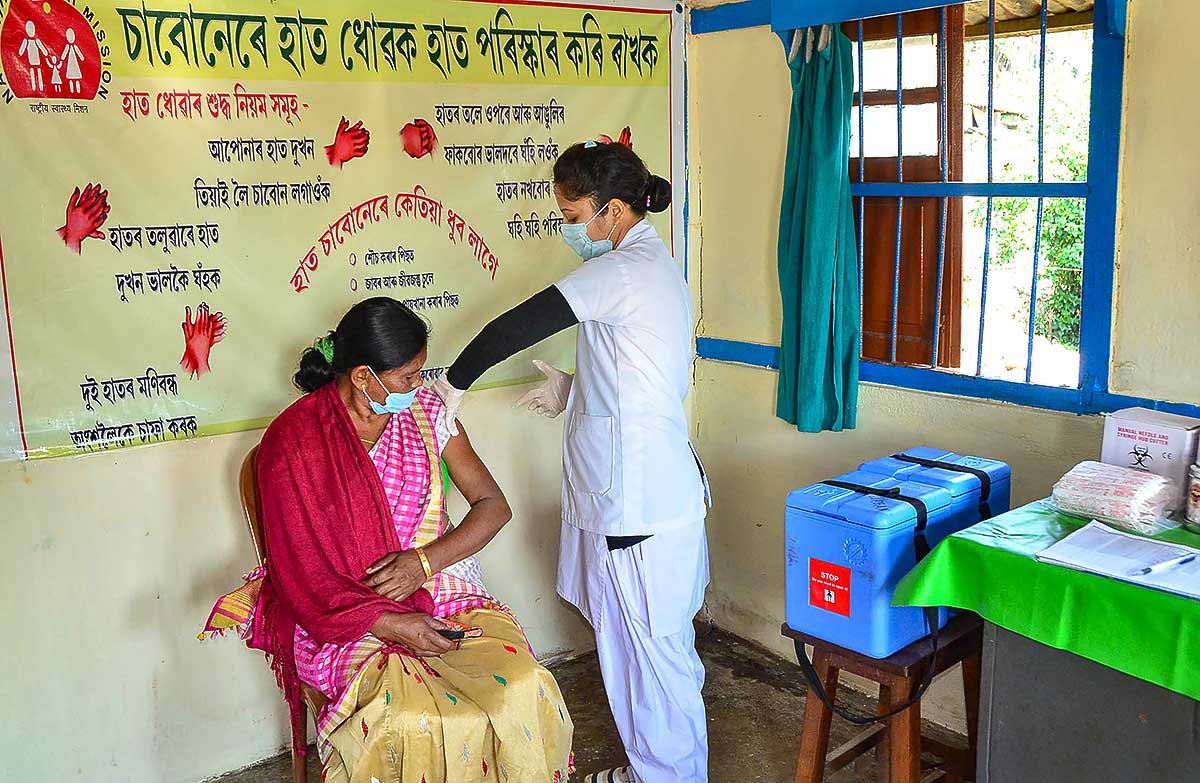 | « Back to article | Print this article |
Of the 23.9 million vaccinators who provide vaccination under the universal immunisation programme, 15.4 million will be used for Covid vaccination.

Barely days away from the roll-out of a COVID-19 vaccine in India, the Centre has directed all the states and Union Territories to conduct a dry run of the immunisation drive on Saturday, January 2, to check the preparedness of the healthcare ecosystem.
The drill will also test the health authorities's abilities to manage vaccine supply, storage and logistics, including cold chain management.
The government has trained 96,000 vaccinators so far for the world's largest immunisation exercise. A helpline, 104, is also being augmented by states for any vaccine-related queries.
'The objective of the dry run is to assess operational feasibility in the use of Co-WIN application in field environment, test the linkages between planning and implementation, and identify the challenges and guide way forward prior to actual implementation. This is also expected to give confidence to programme managers at various levels,' the Union health ministry said.
All the state capitals will conduct the dry run on Saturday at three session sites, some of which might be in difficult terrain with poor logistical support.
According to the ministry's estimates, 29,000 cold chain points, 240 walk-in coolers, 70 walk-in freezers, 45,000 ice-lined refrigerators, 41,000 deep freezers, and 300 solar refrigerators will be required as the vaccine is rolled out across the country.
Of the 23.9 million vaccinators -- auxiliary nurses and midwives who provide vaccination under the universal immunisation programme -- 15.4 million will be used for Covid vaccination, the ministry had said earlier.
The medical officer in charge will identify 25 test beneficiaries (healthcare workers) at each session site and their data will be uploaded on the Co-WIN app as mentioned in the operational guidelines by the health ministry.
The exercise will also involve physical verification of all the proposed sites to ensure that there is adequate space, logistics arrangements, Internet connectivity, electricity, and safety.
For instance, the three model session sites in each state must have separate entry and exit points in a 'three-room set-up' with adequate space outside for awareness activities.
States should have identified vaccination teams and made sure they are well-versed in the standard operating procedures and trained for administering the vaccine.
An important focus of the dry run will be on managing any possible adverse events following immunisation, in addition to the adherence and management of infection control practices at the session site, to prevent transmission of the disease.
The mock drill will include concurrent monitoring and review at the block and district levels and preparation of feedback, which will then be shared with the ministry.
The first round of the dry run was conducted in Andhra Pradesh, Assam, Gujarat, and Punjab on December 28-29, 2020, in two districts each where five session sites with 25 beneficiaries each were identified.
'No major issues were observed in the operational aspects during this dry run. All states expressed confidence in the operational guidelines and IT platform for large-scale programme implementation,' the ministry said.
India could start the new year with an approved COVID-19 vaccine, the country's drug regulator indicated on Thursday, a day before a panel of experts meet to consider requests for emergency use authorisation of three vaccine candidates.
'Probably we will have a happy new year with something in hand. That's what I can hint at,' said V G Somani, Drugs Controller General of India at a webinar on the science of vaccine development.
Somani assured that processes were fast tracked by allowing parallel and seamless phase one and two trials, and there had been no compromise on the safety or efficacy of the data.
'It has been possible to compress timelines...The only thing is that the regulator has accepted partial data for emergency use authorisation,' he added.
The regulator has decided to have at least 50 per cent efficacy for a vaccine, which is approved on the basis of international guidance.
He also said that it had been a challenge to handle vaccines on different platforms and have correct chemistry, manufacturing and control data, and validated assay methods.
'Industry and research organisations have stood the test of time. Along with the Department of Biotechnology we made a commitment that there will be a rapid response,' Somani said.
The Serum Institute of India has stockpiled 75 million doses of the AstraZeneca-Oxford University COVID-19 vaccine, and will be increasing it to 100 million doses by the first week of January, Umesh Shaligram, director, research and development, Serum Institute of India, said.
'Everyone is looking at us to supply this product. If experts approve we will have the emergency authorisation in the coming few days so that we can supply,' Shaligram said.
The Serum Institute will also soon announce the safety data of Novavax, an indigenously developed COVID-19 vaccine by the company.
In the first phase of vaccination, India plans to inoculate 300 million people including health care workers, frontline workers and either those above 50 years of age or with comorbidities.
'With the ecosystem that we have created and the cultural change that has come in along with the proactive planning, we are confident that we will be able to take it forward and deliver to the world,' Renu Swarup, secretary, Department of Biotechnology, said while addressing the webinar.
Swarup said it was for the first time that a vaccine had been developed in less than 12 months. So far, science and technology had been responding to societal needs, but now it is delivering due to the unique innovation ecosystem and national and international collaborations, she added.